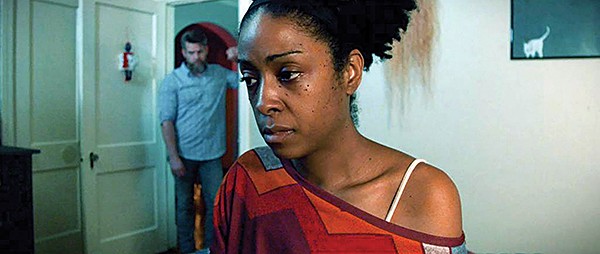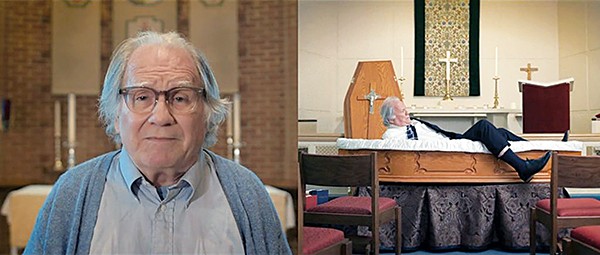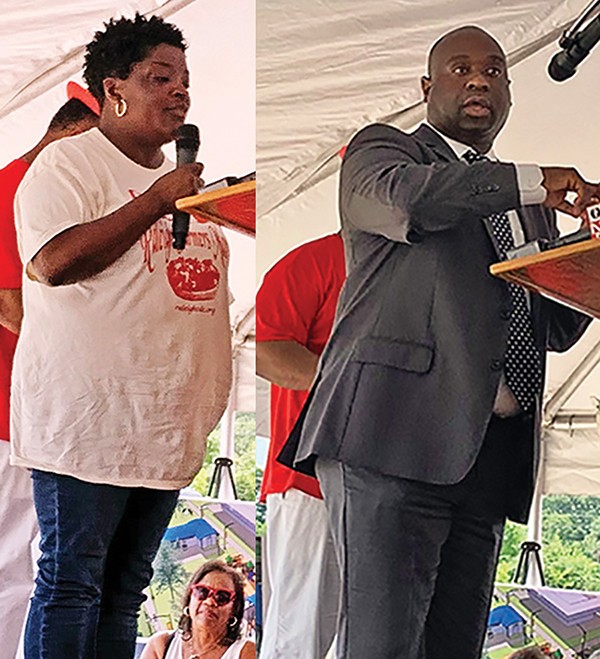Now in its fourth year, the Memphis Film Prize brings together the Bluff City creative community to compete for a $10,000 pot. This year, a record number of short films were submitted to the prize committee, Filmmaker’s Liaison David Merrill says. Of those, 10 finalists were chosen to screen at the festival, which runs at Studio on the Square August 2nd through 3rd. The winner will be chosen with feedback from the audience, who must watch all 10 short films in the program to vote.
Here’s a look at the 10 finalists.
“Soul Man”
Director Kyle Taubken says he was inspired by the New Hollywood films of the 1970s and the indie movement of the 1990s to study film at the Savannah College of Art and Design. In “Soul Man,” an aging musician, played by Curtis C. Jackson, struggles to come to terms with the end of his career. Both the director and the leading man are Film Prize vets. “I’ve had the pleasure to be in a top 10 film for three years in a row, and every year I have so much fun getting to watch the films with all my Memphis friends,” says Jackson.
“Interview With a Dead Man”
Garrett Atkinson wrote and directed this film, which deals with a condemned man’s last reflections on his life. Atkinson has been making films since he was 15 years old. His most recent work is with fight choreographer turned director Six Carolino’s “Gauntlet Run” series of action short films. “‘Interview with a Dead Man’ was made in a short production window with a skeleton crew. Despite the crunch, we knew this project was one we could be proud of,” he says.
“The Memphis Film Prize provided us the opportunity to showcase our film and share our excitement with a local audience,” Atkinson says. “Having been selected as a top 10 finalist was unexpected, and it feels highly rewarding to have our efforts recognized by our peers.”

Pages
“Pages”
“I personally feel like the Memphis Film Prize is one of the best things to happen to Memphis film in many years,” says director Arnold Edwards II. “The spirit of friendly competition among a thriving film community has also fostered camaraderie and mutual support among the competing teams.”
Edwards is the owner of HeroShot Productions, a founding member of the Memphis Write Club screenwriting group, and a mentor with the Grizzlies Foundation CrewUp program. “Pages” is his story of two suicidal people who find solace in each other. Actor Latrersia D. Bobo is a mother of four who caught the acting bug and has produced her own web series, Not My Friends. “This event is huge to me,” she says. “It gives actors like myself something greater to strive and work hard for. I am excited each year that I attend the event, but this year I’m ecstatic.”
“Checklist”
In Jason S. Lockridge’s film, a man sets out to complete a list of tasks, while his friend tries to figure out what’s behind it all. Lockridge, a self-identified “guerrilla filmmaker,” has done two feature films and The Stix, a seven-episode series currently streaming on Amazon. “My first year, I attended as a spectator, and after witnessing the excitement, I decided to make a film myself,” he says. “I’m entering my third consecutive year as a top 10 finalist, and the bar has risen each year.”
“Memphis Film Prize has really opened the door to many actors and filmmakers who never had the drive to produce something of their own,” says “Checklist” actor Everett Anderson. “Memphis is full of creative people, and MFP has really driven me to create more, to be a part of the movement, creating more work for actors and crew while trying to prove to the world Memphis has talent, too.”
“A Night Out”
Director Kevin Brooks won last year’s $10,000 Film Prize with his stunning short “Last Day.” “Memphis Film Prize is a wonderful opportunity for filmmakers to showcase their work and for it to be shown to a wide audience that comes out to these events,” he says. “I’ve been part of it for four years now, starting back to when I was 21, and I think that it has really helped me grow as a filmmaker by causing me to push the envelope of the art that I’m making every year.”
Actor Roslyn Ross, who made an indelible impression in “Last Day,” returns to collaborate with Brooks in this film about a woman who hits the town as she tries to cope with a bad breakup. “Each year, the event gets bigger and better and engages more community participation via the audiences, the sponsors, and the filmmakers,” she says. “I am proud to have had work represented in this festival since its inception in 2016 and to have roles in two top 10 films for the third year in a row.”
“Hangry”
“When I set out to write ‘Hangry,’ I had one single goal in mind — make audiences smile,” says director Clint Till. “I knew I wanted to make a comedy, but the humor needed to have a level of authenticity, coming from characters that felt genuine and relatable.”
Till is a veteran with two decades of experience in cinematography and post production under his belt who currently works with ALSAC/St. Jude. “I’m thrilled that, once again, I’ve made the Memphis Film Prize Top 10 with my short film ’Hangry,‘ a comedy about one elderly man’s attempt to right a lunchtime wrong,” he says. “The Memphis Film Prize helps break down silos between filmmakers in the area and encourages them to collaborate.”
“Mea Culpa”
Will Robbins’ short film “Minority” won Best Hometowner Short at Indie Memphis 2018. “Mea Culpa” is the Nashville native’s third Film Prize Top 10. “Family and friends can tell you how awesome you are, because they’re supposed to right?” he says. “Rarely do you hear that you are terrible or that you don’t have the chops. The Memphis Film Prize gives you a piece of validation, when often times it’s so easy to feel overlooked. I always appreciate the quality of projects showcased during the festival. You can see that they care and are open to diverse voices.”
Robbins’ collaborator Tamiko Robinson Steele was voted Best Nashville Theater Actress in 2017, and won Best Actress at the International Black Film Festival in 2018. She plays opposite Rebecca Lines, who has done more than 50 film roles after making her debut in the Netflix series House of Cards. “Working so closely with Will Robbins, Tracee Roderick, and Caleb Dirks on ‘Mea Culpa’ was an absolute joy, and acting opposite of the incomparable Tamiko Robinson Steele was creative heaven,” she says.
‘Without a Roof”
Lauren Cox worked in Memphis theater for years before decamping to Los Angeles to work on the screen. In “Without a Roof,” her directorial debut, she plays a pregnant woman who is forced to live on the streets after fleeing an abusive partner. “I think it’s amazing what Memphis Film Prize is doing for the film community in this area,” she says. “There is so much hidden talent in our city, and this festival is helping to shine a light on that. Before settling down to start a family, I was able to work in different areas of the country, so it was a huge answer to prayer to come home and find that I could continue on this career path in my hometown.”

Life After Death
“Life After Death”
Director Noah Glenn got his start shooting short documentaries for Choose901. He now runs Perpetual Motion studio, which has won awards from the American Advertising Federation and Adobe. “As I get to know other Memphis filmmakers, I find a welcoming community that is excited to lend a hand and work together in a spirit of collaboration over competition,” he says. “In fact, I was invited to run sound for two other finalists, Kyle Taubken’s ‘Soul Man,’ and Lauren Bell Cox’s ‘Without a Roof,’ and I lent a haze machine to be used in production for Kevin Brooks’ ‘A Night Out.’ Kyle Taubken even returned the favor, helping with production of ‘Life After Death’ … While I certainly hope my film wins over enough of the audience to take home the prize, I’m proud just to share a screen with such a talented group of filmmakers.”
Ron Gephart plays the soon-to-be-deceased title role. “As an actor, I’ve enjoyed the opportunity to work with student filmmakers as well as seasoned pros in feature films and shorts,” he says. “When he called me to participate in his film this year, I was especially delighted that we had a little more crossover to the theater community. We don’t have to leave home anymore. Some of the most satisfying work I’ve done has been within bicycling distance.”
“Truth Lies Upstream”
Director Robb Rokk is the founder of the Desoto Arts Institute (DAI), where he teaches classes in all aspects of filmmaking. This is his fourth appearance in the Film Prize Top 10. Last year’s entry, “Outside Arcadia,” went on to screen at more than 30 film festivals worldwide. In “Truth Lies Upstream,” two men try to get at the truth behind a brutal crime by interrogating the reluctant suspect. “Memphis Film Prize has been a great experience for me and my student crew and has inspired DAI to launch the DeSoto Film Festival coming this October,” he says.
 Immigration and Customs Enforcement
Immigration and Customs Enforcement 

 Photographs by Jackson Baker
Photographs by Jackson Baker 